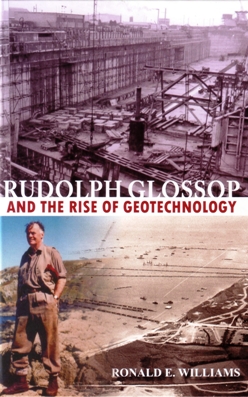
Rudolph Glossop and the Rise of Geotechnology
Geoscientist 21.11 December 2011/January 2012
Rudolph 'Silas' Glossop (1902-1993) is a legend among engineering geologists and geotechnical engineers, and is remembered by the Society's Engineering Group each year in the prestigious Glossop Lecture. I confess to initial disappointment at finding within the first words of Professor Burland's Foreword that “this book is not a biography”, which thus remains to be written; though there have been some excellent short accounts - notably Professor Skempton's 1993 obituary of Glossop in Géotechnique. However, one is soon enchanted by the book’s real purpose, which is to celebrate Glossop's “unique contribution” to the development of ‘geotechnology' in the UK, by providing a treasure chest of his ‘selected journals, diaries and letters' - a subtitle that should have appeared on the cover.
There is a tantalisingly short introduction by the editor. We learn that Glossop trained and started his professional life as a mining engineer, but fortunately for us a crisis in mining caused him to move to civil engineering and he joined John Mowlem in 1937 - staying until retirement in 1967. Thereafter, the editor lets the story be told through Glossop's own words, presenting journals (118 pp), diaries (37 pp), letters (24 pp) and writings (94 pp) - including two early papers, one with Hugh Golder (1944) and the other with Alec Skempton (1945). These selections are illustrated with interesting contemporary B&W photographs and drawings. The book is completed by a 'Directory of people mentioned in the diary', a bibliography of Glossop's publications, references and an index of names (but curiously, no general index).
This is a book for dipping into, and increasingly for reading the sections that grab your fancy. Not dry reading at all, he writes in his journal: "As far as I know, only one of my people died of witchcraft..." (Ghana, 1933); "Golder and I began our investigation into the cause of runway failures from scratch..." (1939); "I left for Normandy as a member of a small team under Brigadier Sir Bruce White, which was sent out to prepare a private report for Churchill..." (Mulberry harbours, Normandy, 1944); "I took another day off, and spent it in the Rift Valley with Dr Leakey..." (Kenya, 1952). Similarly from the (regrettably limited) diaries: "This was the first time that I met Terzaghi and the evening was a tremendous success..." (1960). Letters are also engaging, including fascinating exchanges with such famous friends as Laurits Bjerrum, Karl Terzaghi and Alec Skempton. Further writings are selected to demonstrate both Glossop’s pivotal role and the "profound effect" of Karl Terzaghi in developing geotechnology in the UK.
I have no hesitation in recommending this anthology as a fascinating insight into the life and works of Glossop and a catalogue of famous geotechnologists. Enjoy this book.
Reviewed by Ian Sims
RSK STATS Limited, Hemel Hempstead
RUDOLPH GLOSSOP AND THE RISE OF GEOTECHNOLOGY
RONALD E WILLIAMS (ed) Published by: Whittles Publishing, Caithness. Publication date: 2011. ISBN: 978-1-84995-021-3 284 pp.
List price: £50.00
www.whittlespublishing.com